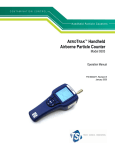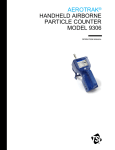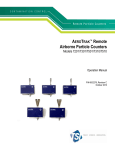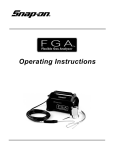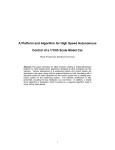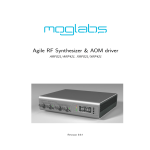Download "service manual"
Transcript
Optical Particle Counters Models 8240/8260 AEROTRAKTM Portable Optical Particle Counters Operation and Service Manual 1980544, Revision A September 2006 Models 8240/8260 AEROTRAKTM Portable Optical Particle Counters Operation and Service Manual 1980544, Revision A September 2006 SHIP TO/MAIL TO: TSI Incorporated 500 Cardigan Road Shoreview, MN 55126-3996 USA U.S. Technical Support: (800) 874-2811/(651) 490-2811 Fax: (651) 490-3824 E-mail address: [email protected] Website: http://www.tsi.com INTERNATIONAL Technical Support: (001 651) 490-2811 Fax: (001 651) 490-3824 Copyright © TSI Incorporated / 2006/ All rights reserved. Address TSI Incorporated / 500 Cardigan Road / Shoreview, MN 55126 / USA Fax No. (651) 490-3824 LIMITATION OF WARRANTY AND LIABILITY (effective July 2000) Seller warrants the goods sold hereunder, under normal use and service as described in the operator's manual, shall be free from defects in workmanship and material for thirty-six (36) months, or the length of time specified in the operator's manual, from the date of shipment to the customer. This warranty period is inclusive of any statutory warranty. This limited warranty is subject to the following exclusions: a. Hot-wire or hot-film sensors used with research anemometers, and certain other components when indicated in specifications, are warranted for 90 days from the date of shipment. b. Parts repaired or replaced as a result of repair services are warranted to be free from defects in workmanship and material, under normal use, for 90 days from the date of shipment. c. Seller does not provide any warranty on finished goods manufactured by others or on any fuses, batteries or other consumable materials. Only the original manufacturer's warranty applies. d. Unless specifically authorized in a separate writing by Seller, Seller makes no warranty with respect to, and shall have no liability in connection with, goods which are incorporated into other products or equipment, or which are modified by any person other than Seller. The foregoing is IN LIEU OF all other warranties and is subject to the LIMITATIONS stated herein. NO OTHER EXPRESS OR IMPLIED WARRANTY OF FITNESS FOR PARTICULAR PURPOSE OR MERCHANTABILITY IS MADE. TO THE EXTENT PERMITTED BY LAW, THE EXCLUSIVE REMEDY OF THE USER OR BUYER, AND THE LIMIT OF SELLER'S LIABILITY FOR ANY AND ALL LOSSES, INJURIES, OR DAMAGES CONCERNING THE GOODS (INCLUDING CLAIMS BASED ON CONTRACT, NEGLIGENCE, TORT, STRICT LIABILITY OR OTHERWISE) SHALL BE THE RETURN OF GOODS TO SELLER AND THE REFUND OF THE PURCHASE PRICE, OR, AT THE OPTION OF SELLER, THE REPAIR OR REPLACEMENT OF THE GOODS. IN NO EVENT SHALL SELLER BE LIABLE FOR ANY SPECIAL, CONSEQUENTIAL OR INCIDENTAL DAMAGES. SELLER SHALL NOT BE RESPONSIBLE FOR INSTALLATION, DISMANTLING OR REINSTALLATION COSTS OR CHARGES. No Action, regardless of form, may be brought against Seller more than 12 months after a cause of action has accrued. The goods returned under warranty to Seller's factory shall be at Buyer's risk of loss, and will be returned, if at all, at Seller's risk of loss. Buyer and all users are deemed to have accepted this LIMITATION OF WARRANTY AND LIABILITY, which contains the complete and exclusive limited warranty of Seller. This LIMITATION OF WARRANTY AND LIABILITY may not be amended, modified or its terms waived, except by writing signed by an Officer of Seller. Service Policy Knowing that inoperative or defective instruments are as detrimental to TSI as they are to our customers, our service policy is designed to give prompt attention to any problems. If any malfunction is discovered, please contact your nearest sales office or representative, or call TSI at (800) 874-2811 (USA) or (001 651) 490-2811 (International). ii CONTENTS SAFETY INFORMATION .........................................................................V Laser Safety .............................................................................................v Labels......................................................................................................vi Description of Caution/Warning Symbols ............................................ vii Caution and Warning Symbols ............................................................. vii CHAPTER 1 UNPACKING AND PARTS IDENTIFICATION.............1 Unpacking the AEROTRAK Portable Optical Particle Counter .................1 Optional Accessories ...............................................................................2 Spare/Replacement Parts..........................................................................3 CHAPTER 2 SET UP ..................................................................................5 Supplying Power to the AEROTRAK™ Optical Particle Counter .............5 Daily Zero Check.....................................................................................7 Integral Thermal Printer...........................................................................8 Using the Isokinetic Probe .......................................................................9 Options...................................................................................................11 CHAPTER 3 OPERATION ......................................................................13 Screen Layout and Functionality ...........................................................14 CHAPTER 4 COMMUNICATION .........................................................31 Setting Parameters using TRAKPRO Software ........................................31 Downloading Data Using TRAKPRO Software.......................................33 Bulk Data Storage Capability ................................................................38 Accessing the Data in the File Viewer Window ....................................38 Data Folders ...........................................................................................39 Viewing Folder Contents .......................................................................39 CHAPTER 5 MAINTENANCE................................................................41 Maintenance Schedule ...........................................................................41 Daily Zero Check...................................................................................41 Cleaning the Instrument Enclosure ........................................................41 CHAPTER 6 TROUBLESHOOTING .....................................................43 APPENDIX A SPECIFICATIONS .........................................................47 Temperature/RH Probe Specifications...................................................49 Air Velocity Probe Specifications..........................................................49 Application Notes can be found at TSI’s web site: http://www.tsi.com iii Safety Information IMPORTANT There are no user serviceable parts inside the instrument. Refer all repair and maintenance to a qualified factory-authorized technician. All maintenance and repair information in this manual is included for use by a qualified factoryauthorized technician. Laser Safety • The Model 8240 and 8260 Optical Particle Counters are Class I laserbased instruments • During normal operation, you will not be exposed to laser radiation • Precaution should be taken to avoid exposure to hazardous radiation in the form of intense, focused, visible light • Exposure to this light may cause blindness Take these precautions: • DO NOT remove any parts from the OPC unless you are specifically told to do so in this manual • DO NOT remove the housing or covers. There are no serviceable components inside the housing WARNING The use of controls, adjustments, or procedures other than those specified in this manual may result in exposure to hazardous optical radiation. v Labels Advisory labels and identification labels are attached to the outside of the OPC housing and to the optics housing on the inside of the instrument. 1. Serial Number Label (back panel) 2. Laser Radiation Label (internal) DANGER LASER RADIATION WHEN OPEN AVIOD DIRECT EXPOSURE TO BEAM 3. Electrical Shock caution and no user serviceable parts (back panel) CAUTION No user serviceable parts inside. Refer service to qualified personnel. To avoid electrical shock, the power cord protective grounding conductor must be connected to earth ground 4. Laser Instrument compliance label (back panel) 5. AC Power Label (back panel) Class 1 Laser Product This product is in complete compliance with 21 CFR 1040, 10 and 1040, 11 AC Power In 100-240 VAC 50-60 Hz, 1.0A Max 6. European symbol for nondisposable item. Item must be recycled. (back panel) vi Models 8240/8260 AEROTRAK Portable Optical Particle Counters Description of Caution/Warning Symbols Appropriate caution/warning statements are used throughout the manual and on the instrument that require you to take cautionary measures when working with the instrument. Caution Caution Failure to follow the procedures prescribed in this manual might result in irreparable equipment damage. Important information about the operation and maintenance of this instrument is included in this manual. Warning WARNING Warning means that unsafe use of the instrument could result in serious injury to you or cause damage to the instrument. Follow the procedures prescribed. Caution and Warning Symbols The following symbols may accompany cautions and warnings to indicate the nature and consequences of hazards: Warns that uninsulated voltages within the instrument may have sufficient magnitude to cause electrical shock. Warns that the instrument contains a laser and that important information about its safe operation and maintenance is included in the manual. Warns that the instrument is susceptible to electro-static discharge (ESD) and ESD protection should be followed to avoid damage. Indicates the connector is connected to earth ground and cabinet ground. Safety vii Chapter 1 Unpacking and Parts Identification Unpacking the AEROTRAK Portable Optical Particle Counter Carefully unpack the AEROTRAK Optical Particle Counter from the shipping container. 1 6 2 4 3 8 5 7 Model 8240 AEROTRAK Optical Particle Counter Qty. 1 Item Description AEROTRAK Optical Particle Counter 1 1 1 AC power cord Rechargeable lithium ion battery Isokinetic probe, Model 8240/8260 2 1 1 2 Stylus Carrying case Computer cable, USB HEPA zero filter, with adapter Part/Model 8240 or 8260 1303053 1208057 1300085 or 1300086 N/A 1310061 1303740 1300088 Ref. 1 2 3 4 5 6 7 8 1 2 1 3 Service Manual, Certificate, and TRAKPRO Software Qty. 1 1 1 Item Description Operation and Service Manual Calibration Certificate TRAKPRO Software Part/Model 1980380 N/A 1090014 Ref. 1 2 3 Optional Accessories 2 1 5 4 3 Accessories Item Description External battery charger with AC adapter and power cord Rechargeable lithium ion battery Air velocity probe Temperature/humidity probe Tripod for the isokinetic probe 2 Part/Model 2610114 Ref. 1 1208057 8592 1300102 3000192 2 3 4 5 Chapter 1 Spare/Replacement Parts The following items may be purchased as spare or replacement parts. Qty. 5 rolls 1 Item Description Thermal paper for integral printer Fuse - 250V, 1 AMP, TYPE "T", 5 mm x 20 mm Unpacking and Parts Identification Part/Model 2608011 1605077 3 Chapter 2 Set Up Supplying Power to the AEROTRAK™ Optical Particle Counter Installing the Battery The Model 8240 or 8260 AEROTRAK Optical Particle Counter (OPC) may be powered in two ways: • Rechargeable lithium-ion battery • AC power cord Installing the Battery To install the battery: 1. Remove the battery door on the back of the instrument by turning the thumbscrew ¼ turn counterclockwise 2. Slide the battery into the slot, pressing until it clicks into place 3. Close the battery door and lock the thumbscrew with a ¼ turn clockwise WARNING The battery supplied by TSI (PN 1208057) has built in protection against explosion and fire hazard. Do not use a substitute. 5 WARNING Do not use non-rechargeable batteries in this instrument. Fire, explosions, or other hazards may result. Using AC Power • When using the AC power, the battery (if installed) charges while the instrument is on, but not while actively sampling • The AEROTRAK Optical Particle Counter has an internal, non-user accessible battery to maintain settings and save logged data • Removing/changing the lithium-ion battery or disconnecting AC power does not cause the loss of data • TSI will install a new internal battery as part of routine service, as necessary 5 6 4 3 1 2 Back Panel 1. AC socket 4. Exhaust 2. Battery access cover 3. USB Port 5. Air velocity probe port 6 Flow compensation temperature sensor 6 Chapter 2 Daily Zero Check A zero check should be performed at least once a day and before conducting any important testing or certification. Attaching Zero Filter Assembly 1. Turn on the instrument and wait until the main menu is displayed 2. Remove the Isokinetic probe if attached 3. Attach the supplied zero filter assembly consisting of two filter cassettes and an adapter to the inlet nozzle located on the top of the instrument 4. Allow the instrument to purge for 2 minutes 5. After the purge cycle, continue to sample. In accordance with JIS standards, there should be no more than 1 particle counted at any size in 5 minutes Remove the zero filter assembly; the instrument is now ready for operation 6. Set Up 7 Notes: 1 If the instrument does not go to zero, refer to Chapter 6, Troubleshooting, for additional information. 2. The daily zero check cannot be performed when the isokinetic probe is attached to the instrument. Integral Thermal Printer • A hard copy of a sample set, statistics or an ISO test can be printed from the instrument • The AEROTRAK OPC is equipped with an automatic print feature to print automatically after each test is completed that can be enabled under the “Settings” menu • Printer paper has a colored strip printed on the last few feet of each roll to indicate time to change the paper roll • When installing a new roll of paper, the tag end should be from the bottom of the roll and pulled through the printer door Integral Thermal Printer 8 Chapter 2 Using the Isokinetic Probe The Isokinetic probe smoothly accelerates air into the inlet of the instrument. The inlet diameter of the conical shaped probe is matched to the 90 ft/min flow rate, ±20%, which is typical for many HEPA filters. Sampling with Isokinetic Probe Assembly Optional Adjustable Tripod Mount • The probe is pushed onto the inlet nozzle or • Can be used with an optional adjustable tripod mount if air is moving in a direction other than straight down Set Up 9 Optional Temperature/Relative Humidity Probe To install the optional temperature/relative humidity probe: • Align the small red dot at the base of the probe to the front of the OPC • Press the probe into the socket until it clicks • Temperature and relative humidity automatically display • The probe can be removed by lifting it straight up Temperature/Relative Humidity Probe 10 Chapter 2 Optional Air Velocity Probe To install the optional air velocity probe: • Orient the black detent button in the up position • Press firmly into the socket until it clicks • To remove the probe, depress the black detent button and pull the plug straight back Air Velocity Probe Options • User selectable units of measure in ft/min, ft/s, m/min or m/s • A running average value may also be selected between 1 and 10 seconds Set Up 11 Chapter 3 Operation • Press and hold the ON/OFF switch (located in the lower left of the front of the instrument) for a few seconds to turn on the AEROTRAK OPC • A brief start-up sequence which takes about 15 seconds, begins • A splash screen displays a TSI logo • When the main menu appears, the instrument is ready for operation • The unit is equipped with a small green LED above the ON/OFF switch to indicate that the unit is on • As a power saving measure, after 15 minutes, the backlight turns off. A touch to the screen re-activates the backlight. Main Menu The AEROTRAK Optical Particle Counter is controlled using a touch screen display. Use a plastic stylus or finger tip. DO NOT use sharp objects that may damage the screen overlay. Main Menu 13 Screen Layout and Functionality The following explains the functions of the various touch screen commands. Start/Stop • Start—(green background) begin a sample test • Stop—(red background) end a sample test Note: Data will not be saved if a test is interrupted Settings 14 Chapter 3 Language Info Main • Colors—screen colors: selectable for background, buttons and text • Set Date—date should be entered as MM/DD/YYYY using a popup keypad (not shown) and selecting the MM/DD/YYYY or DD/MM/YYYY format • Set Time—pop-up keypad (not shown) for setting the time format to AM/PM or 24 hour • Touch calibration—set screen touch locations • Language—select language on the display • Information—unit serial number, model number, firmware version, and the last calibration date • Brightness—user adjustable from 0 to 100 • Main—return to the Main Menu Operation 15 Reporting ISO 14644 Reporting Options • Class—select ISO class of cleanliness from 2 to 9 • Size (µm)—select particle size selected. ISO 14644-1 specifies sizes of 0.1, 0.2, 0.3, 0.5, 1.0, and 5.0 microns Note: If bins are adjusted to sizes other than those listed in ISO 14644-1, the ISO reporting feature is not available • Room—select a room • Location—select a location within a room 16 Chapter 3 • Report—display a report based on ISO 14644-1 and the criteria selected • Main—return to the Main Menu ISO Report Format Information shown at the top of this screen includes data selected on the report screen including room, ISO class, locations selected, particle size channel selected and the count limit for the parameters selected • First—go to the first saved test • Up—go to the next saved test • Print—print the test displayed • Last—go to the last test saved • Down—go to the previous test saved • Back—return to the test set-up screen Operation 17 Statistics Statistics Set-up Screen • Room—select a room from a drop down menu • Location—select a location • Show Statistics—display summary information • Main—return to the Main Menu 18 Chapter 3 Show Statistics Information at the top of the screen shows data selected on the statistics setup screen including room, location selected, date and time. • Count mode—toggle between summary (Σ) or differential (Δ) count • Counts—toggle between actual count, count/ft3 or count/m3 • Sample—toggle between individual sample or an average of samples • Previous—go to the previously saved test • Next—go to the next saved test • First—go to the first saved test • Last—go to the last test saved • Print—print the information displayed • Back—return to the statistics set-up screen Operation 19 Print • Print—print the information displayed Measurement 20 Chapter 3 Measurement • Volume—set amount of air sampled in ft3 or m3 • Start Delay—set time before test sample begins from 10 seconds to 24 hours • Sample Delay—set time between multiple tests from 10 seconds to 24 hours • Number of Samples—set number of tests to be repeated with the same parameters up to 999 tests • Temperature—select between °F or °C • Set—save the parameters selected • Main—return to the Main Menu Operation 21 Counts • 22 Counts is a toggle key to show units between: • Actual number count for a given time or volume sample or • Counts/ft3 (projected if volume sampled is less than 1 cubic foot) or • Counts/m3 (projected if volume sampled is less than 1 cubic meter) Chapter 3 Count Mode • Count Mode—a toggle key to select between: Total or summary count mode (Σ) appears as “>0.3 µm” and all particles 0.3 µm and greater are counted and displayed in that channel or bin Differential count mode (Δ) appears as “0.3–0.5 µm” and only particles between 0.3 and 0.5 µm are counted and displayed Operation 23 Conditions 28.3 LPM Time—user selectable format in “Settings” Date—user selectable format in “Settings” Flow rate—Shows the actual flow rate of the sample during a test; the average flow rate of the sample is saved Temperature/humidity—displayed when the optional probe is attached Location Identification 24 Chapter 3 Location Identification to Save Data • Add Room—name a room using a pop-up keypad (not shown), eightcharacter limit • Add Location—name a specific location within a room using the popup keypad, eight-character limit IMPORTANT: To save a data set, a room and location must be selected either from memory or created • Delete Room—remove the room name from memory • Delete Location—remove the location name from memory • Delete Room Data—remove the data set from a selected room name from memory • Delete Location Data—remove the data set from a selected location name from memory • Enabled—sets the room and location information shown as the location where sample data is logged and saved • Disabled—turn the room and location information off, no data will be saved Operation 25 Program Setting Test Criteria • The initial Program screen allows the selection of previously saved test criteria using a drop-down menu • Test criteria can be created on the screen using other keys such as: Number of samples Sample volume Start and sample delays Count format Bins on/off, size selected, alarm on/off and alarm set points • This information can now be named and saved using a pop-up keyboard screen (not shown) 26 Chapter 3 Select Program • Select Program—a drop-down menu appears and a previously saved test program can be selected • OK—enables the selected test program using saved criteria • Cancel—disable the program • Save—allow criteria selected from the main menu to be saved for future reference. A pop-up keyboard (not shown) allows naming the test program Operation 27 Details This screen shows criteria selected for a given test or program. Battery Battery indicator—shows remaining charge expressed as % 28 Chapter 3 Bin or Channel Characteristics Example—Bin 2 • Bin ON/OFF—determine which bins are displayed; data for all six bins is collected and saved • Alarm ON/OFF—user selectable for one or more bin sizes • Alarm limits—can be set on the numeric pop-up screen (not shown) • Adjusting bin sizes—use the up/down arrows to change bin size ranges in 0.01 micron increments Size selected determines the lower limit of a given channel or bin Sizes selected may not overlap or cross into another channel or bin size Operation 29 • Cannot go below 0.3 microns or above 10 microns Whatever value is selected for Bin 6 will count particles at that size and larger. It is recommended that channel sizes be selected from smallest to largest. Example—Changing bin lower limits to 0.4, 0.6, 2.0, 3.5, 6.0 and 9.0 would result in: Differential Counts Summary Counts 0.4–0.6 >0.4 0.6–2.0 >0.6 2.0–3.5 >2.0 3.5–6.0 >3.5 6.0–9.0 >6.0 >9.0 >9.0 • Set—retain settings selected • Restore Defaults—return to factory settings of 0.3, 0.5, 1.0, 3.0, 5.0 and 10 microns in optical diameter 30 Chapter 3 Chapter 4 Communication Setting Parameters using TRAKPRO Software Room and Location Setup Room and Location Setup • Settings for rooms and locations can be created or edited, then saved to the computer or uploaded to the instrument • There is an eight-character limit for room and location names 31 Measurement Programs Measurement Programs • Program for sampling criteria can be created or edited and then saved or uploaded to the OPC • There is an eight-character limit for program names • Number of test samples with identical criteria to be run consecutively from 1 to 999 • Start delay and time between samples can be set from 10 seconds to 24 hours • Bin size may be adjusted between 0.3 and 10.0 microns in 0.01 increments. Bin size selected determines the lower limit of a given channel or bin and affects the adjacent bin. Bin sizes may not overlap or cross into another channel or bin size. The value selected for Bin 6 or the largest bin will count particles at that size and larger. 32 Chapter 4 Saving Programs • A program can be saved internally to the AEROTRAK OPC or to a file on a computer via the USB connection for future reference Opening Program • A program can be opened from those saved in the AEROTRAK OPC or from a saved file on a computer via the USB connection and loaded into the program settings editor Downloading Data Using TRAKPRO Software Use TRAKPRO to transfer data from an instrument to a computer via the USB connection for further analysis and report generation. Copy/Move Data • Choose either Copy Data or Move Data under the Preferences tab • To begin data transfer, select Receive from the File menu or press the receive button on the menu bar. If TRAKPRO finds an attached AEROTRAK OPC instrument, a dialog appears prompting you to select the folder to save the data Communication 33 • To cancel the data transfer, select Cancel • To accept data transfer, select OK • The data folder is named “Data – Date and Time”, the date and time will be the time at which the data transfer occurred expressed in Coordinated Universal Time (UTC), not local time • After transfer, the data set opens Opening Saved Data 1. Select Open from the File menu or Press • 34 on the menu bar or An open data browser appears and the desired data set can be selected Chapter 4 Data Selection • Use the data tree to select the samples to include in the display or calculation • Selected sets or individual samples have a green next to them • Files that are not selected have a red • Within a set, if some samples are selected and others not, a blue appears next to them Data Display • When samples have been selected, information appears in the Data Display window. Select the Data Display tab • To choose between a summed or differential histogram, right-click on the data display and select Graph Type • When the differential graph type is selected, each bin size value represents the lower size boundary for that bin and the width of the bin is determined by the lower boundary of the next larger bin. For example, the 0.3 μm bin contains particles from 0.3 μm up to 0.5 μm; the 0.5 μm bin contains data for particles from 05 μm up to 1.0 μm, etc. • When the summed graph type is selected, each bin size value represents the lower boundary and all larger particles Communication 35 • The Data Table shows a summary for the selected data. The table has six rows: size, average, minimum, maximum, standard deviation, and samples • The units for the average, minimum, maximum, and standard deviation can be expressed as #/cm3, #/m3, #/ft3 the total count for a given sample volume • To change the units, right-click on the Data Display and select the desired units from the Conc. Units submenu. • The final section of the Data Display contains measurement details, a summary of the test conditions including date and volume statistics. Temperature and humidity statistics are also shown if the optional temperature/humidity probe is used • To change the volume units, right-click on the Data Display, select Volume Units, and then choose the desired units 36 Chapter 4 • To change the temperature units, right-click on the Data Display, select Temp. Units Reporting ISO 14644 Conformance Testing • Use the ISO 14644 tab to compare selected data to the ISO 14644-1 specifications and prescribed bin sizes of 0.1, 0.2, 0.3, 0.5, 1.0, 3.0 and 5.0 microns. User-defined bin sizes cannot be used for ISO 14644 conformance testing • To use the ISO 14644 display, select the desired ISO classification (Class 2 – Class 9), the desired particle size, the desired data set and samples • Selected readings for a location will be averaged and each individual sample and average is compared to the ISO specification for the selected class and size. Either the individual samples and averages or just the averages alone can be displayed. Communication 37 • The last row shows the 95% upper confidence level (UCL) of all the displayed data. The ISO standard requires between two and nine locations; therefore, if fewer than two or more than nine locations are selected, the upper confidence level will not be calculated. Bulk Data Storage Capability • When connected via the USB cable to a computer, the AEROTRAK appears as an external drive to the computer and data can be removed from the instrument using drag and drop from the Windows Explorer file management program. This feature does not require TRAKPRO to be installed or used and works with Windows XP/2000 computers Accessing the Data in the File Viewer Window • 38 Two folders will appear in the File Explorer window, the data folder holds all data saved to the instrument and the program folder holds settings or test criteria Chapter 4 Data Folders • The data folder has subfolders that correspond to the “rooms” that were entered into the instrument Viewing Folder Contents • Each room folder has specific sample location files • Double-click on a folder to view its contents • The data is stored in CSV format and can be read by Microsoft Excel® Communication 39 Chapter 5 Maintenance Note There are no user-serviceable parts inside this instrument. Opening the instrument case may void the warranty. TSI recommends that you return the AEROTRAK Optical Particle Counter to the factory for any required maintenance or service not described in this manual. Maintenance Schedule TSI recommends annual factory cleaning and calibration for the AEROTRAK OPC Recommended Field Maintenance Schedule Item Frequency Daily zero check Daily (or before each use) Clean inlet Monthly, or as needed Factory cleaning and calibration Annually Wipe down instrument enclosure As needed or per testing protocol prescribed Daily Zero Check • The daily zero check ensures that the instrument is properly assembled and free from leaks, residual particles and electronic noise. Please see Chapter 2, “Set Up” for detailed instructions on performing the zero check. Cleaning the Instrument Enclosure • To clean the stainless steel enclosure, dampen a lint-free cloth in alcohol and gently wipe the surface until surface contamination is removed 41 Chapter 6 Troubleshooting Symptom Possible Cause Corrective Action Counts are too low Instrument is being operated outside temperature or relative humidity specifications Operate instrument within specifications Internal parts have been damaged because instrument was stored at a temperature greater than 122 °F (50 °C) Return to factory for service Instrument has contamination on the optics due to condensation or excessive loading Return to factory for service Laser or pump control is damaged Return to factory for service Unit is due for calibration Return to factory for service On/off switch is not being pressed properly Press and hold on/off switch for one second Battery is dead Recharge battery or connect to AC power AC cord is not plugged into unit Connect AC cord The 1A, 250V fuse, located in the fuse holder immediately above the AC power inlet, has blown Replace fuse Instrument does not turn on 43 Symptom Possible Cause Corrective Action Instrument does not meet zero count specification (<1 particle/5 mins) Only one HEPA filter is being used. Both HEPA filters should be used in series Connect second HEPA filter HEPA filters are not connected properly and room air is leaking into the HEPA filter assembly Check that the HEPA filters have been tightly connected together. Check that both rubber O-rings (black) in the aluminum connector are in place and have not become dislodged Residual particles from previous samples are shedding off internal parts and into the optics Purge instrument by running the instrument for 10–15 minutes before attempting zero count test An internal component has been damaged due to operation outside of temperature specifications or one ore more excessive bumps or jolts, and electronic noise is inducing false counts A leak has developed in the aerosol flow path Return to factory for service Return to factory for service Battery does not charge The unit must be turned on for the battery to charge Turn on unit. Green LED by on/off button will be lit LOW BATTERY ERROR Low battery Recharge battery or connect AC cord PHOTODETECTOR ERROR Direct light is entering the aerosol inlet Remove instrument from direct light Laser has become misaligned due to excessive bumps or jolts Return to factory for service 44 Chapter 6 Symptom Possible Cause Corrective Action SYSTEM ERROR Information is not being read properly by microprocessor Restart instrument. If problem persists, contact TSI technical support TEMPERATURE HUMIDITY PROBE ERROR Temperature/RH probe was not recognized Detach and reconnect probe. If problem persists, contact TSI technical support AIR VELOCITY PROBE ERROR Air velocity probe was not recognized Detach and reconnect probe. If problem persists, contact TSI technical support FLOW ERROR Instrument was unable to control flow rate (if any tubing is connected to OPC) Restart measurement Pressure drop across inlet may be too large Lessen pressure drop across inlet by using larger diameter tubing, less tubing, and/or adding a bleed valve LASER POWER WARNING Laser power has fallen outside of specification Return to factory for service Instrument will not store data file. OPC storage capacity (128 MB) has been reached Remove files from OPC memory Troubleshooting 45 Appendix A Specifications All specifications meet or exceed JIS B 9921 and are subject to change without notice. Particle Size Range........... 0.3 to 10.0 µm Number of Bins ................. 6 Default Bin Cutpoints Default Thresholds............ Cutpoint Accuracy............. Variable Bin Cutpoints Thresholds........................ Cutpoint Accuracy............... 0.3, 0.5, 1.0, 3.0, 5.0, and 10.0 μm 50% ±10% user defined, between 0.3 and 10.0 @ 0.01 µm increments 50% ± 10% for factory settings, 50% ± 20% for any user defined settings Maximum Concentration.. 8240 ………………………. 8260 ………………………. 3 400,000 #/ft (5% coincidence loss) 250,000 #/ft3 (5% coincidence loss) Counting Efficiency .......... 50% ±10% @ 0.3 μm 100% ±10% @ 0.45 µm and greater Zero Count ........................ <1 count in 5 minutes Laser .................................. 660 nm 50 mW laser diode Pump Flow Rate 8240.................................. 8260.................................. 1.0 cfm (28.3 lpm) ±5% 1.77 cfm (50 lpm) ±5% Pressure Correction ......... Performed by internal pressure transducer Sample Output .................. HEPA filtered for zero emissions Operating Environment Temperature ..................... Relative Humidity.............. 41 to 95 °F (5 to 35 °C) 10 to 90 % RH, noncondensing Storage Environment Temperature ..................... Relative Humidity.............. 32 to 122 °F (0 to 50 °C) 0 to 90% RH, noncondensing Display............................... 5.7” (14.5 cm) color LCD with touch screen, 320 x 240 Memory.............................. 128 MB (over 100,000 sample sets) 47 Communication ................ USB Software ............................ TRAKPRO™ Data Analysis Software Reporting .......................... ISO 14644-1 Computer Requirements.. Battery Battery type ...................... Battery life ........................ ® PC with Microsoft Windows 2000 or XP; Windows-compatible printer; 5 MB hard disk space; and available USB serial port (for downloading) Rechargeable Lithium Ion Battery Pack, 6600 mA-hrs 8 hrs, typical use @ 70°F (21°C); 4 hours continuous Power ................................ 100 to 240 VAC, 50 to 60 Hz Fuse ................................... 250V, 1 AMP, TYPE "T", 5 mm x 20 mm Dimensions (Instrument)... 10 in. x 7 in. x 9.5 in. (25.4 cm x 17.8 cm x 24.1 cm) Dimensions (Carrying Case) .................. 21 in. x 14 in. x 14 in. (53.3 cm x 35.6 cm x 35.6 cm) Instrument Weight with battery ....................... 12.8 lbs (5.8 kg) Calibration......................... NIST traceable (included) Factory Service Interval ... Annual service recommended Warranty............................ Three years on workmanship and material 48 Appendix A Temperature/RH Probe Specifications (Optional Accessory) Temperature Range ............................... Accuracy........................... 32 to 95ºF (0 to 35ºC) ±2ºF (±1ºC) Relative Humidity Range ............................... Accuracy........................... 10 to 90% RH ±5% RH Air Velocity Probe Specifications (Optional Accessory) Air Velocity Probe Length Collapsed ... Probe Length Extended .... Range ............................... Accuracy........................... Specifications 11.5 in. (29 cm) 43 in. (109 cm) 0 to 4,000 fpm (0-20 m/s) ±5% of reading or 5 fpm (0.025 m/s), whichever is greater 49 TSI Incorporated 500 Cardigan Road, Shoreview, MN 55126 Tel: +1 651 490 2811 Toll Free: 1 800 874 2811 E-mail: [email protected] P/N 1980544, Revision A Copyright © 2006 TSI Incorporated All Rights Reserved






























































